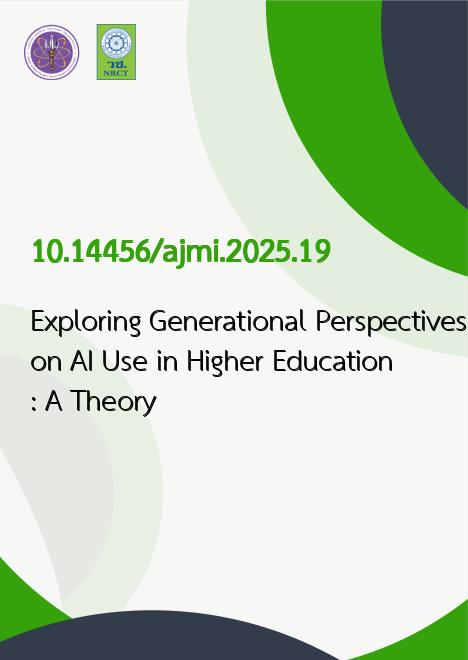
|
Exploring Generational Perspectives on AI Use in Higher Education: A Theory |
|---|---|
| รหัสดีโอไอ | |
| Creator | Jiomarie Jesus |
| Title | Exploring Generational Perspectives on AI Use in Higher Education: A Theory |
| Contributor | Genessa Basilisco, Khay-c G. Gemodo, Gloria E. Espiloy, Cheryl M. Lucero, Jeffy M. Sumilhig |
| Publisher | Mandaue City College Philippines |
| Publication Year | 2568 |
| Journal Title | ASEAN Journal of Management & Innovation |
| Journal Vol. | 12 |
| Journal No. | 2 |
| Page no. | 95 - 110 |
| Keyword | Generational perspectives, artificial intelligence in higher education, technology adoption theory |
| URL Website | https://so13.tci-thaijo.org/index.php/AJMI |
| Website title | AJMI -ASEAN Journal of Management & Innovation |
| ISSN | 2351-0307 |
| Abstract | As artificial intelligence (AI) continues to reshape higher education, this study examines how generational identity influences the adoption and ethical engagement with AI technologies, addressing a gap in mainstream models that often overlook socio-generational dynamics. Using a qualitative grounded theory approach, data were collected from ten purposively selected informants representing Gen Z, Millennials, Gen X, and Baby Boomers across higher education institutions in Metro Cebu. Semi-structured interviews were analyzed through open, axial, and selective coding, supported by constant comparative analysis. The study developed the Generationally Mediated AI Adoption Theory (GMAIAT) following this process. This context-sensitive framework integrates behavioral constructs from the Unified Theory of Acceptance and Use of Technology (UTAUT) and the Theory of Planned Behavior (TPB) with generational worldviews, institutional support, and ethical dispositions. GMAIAT comprises four interrelated domains: Generational Attitudes toward AI, Institutional Support and Ethics, Generational Mediation Cycle, and Cross-Generational Innovation. These domains explain how AI adoption is shaped by cohort-specific digital fluency, peer learning networks, institutional scaffolding, and shared ethical practices. The study positions generational identity as an active mediating construct rather than a passive demographic category. Findings contribute both theoretical advancement and practical insights for inclusive, ethical, and generation-responsive AI integration. Implications include curriculum reforms, faculty training, and intergenerational engagement initiatives. The model also informs broader digital literacy and technology governance efforts, particularly in emerging regional contexts such as ASEAN, where addressing generational gaps is essential for equitable and sustainable AI adoption in education |
